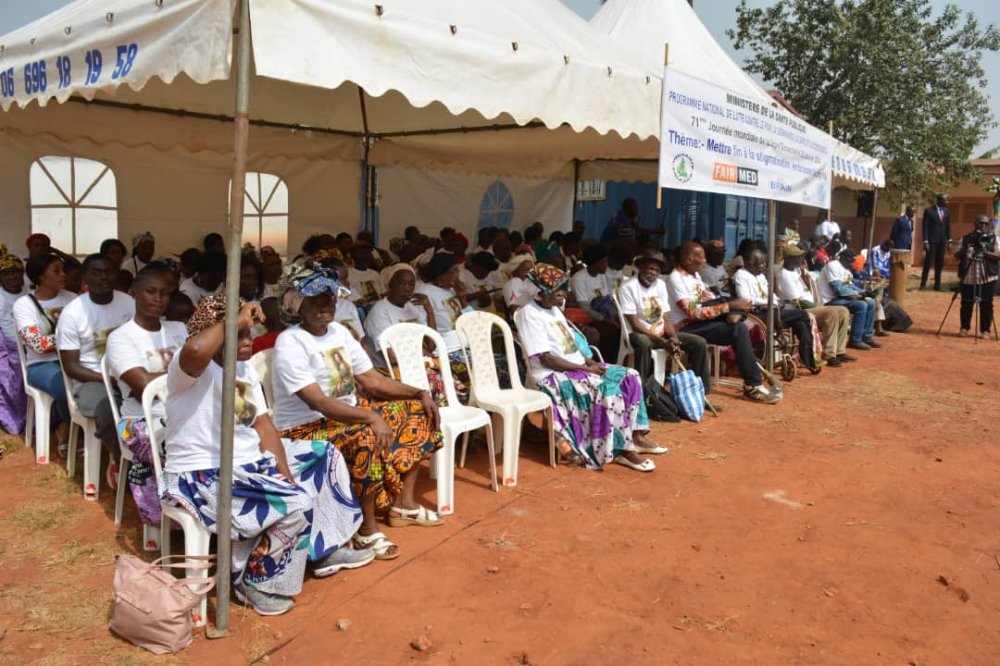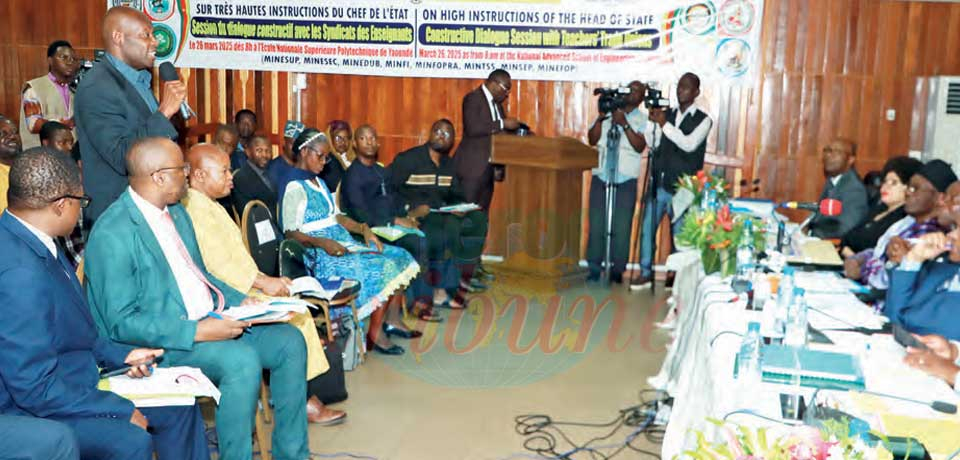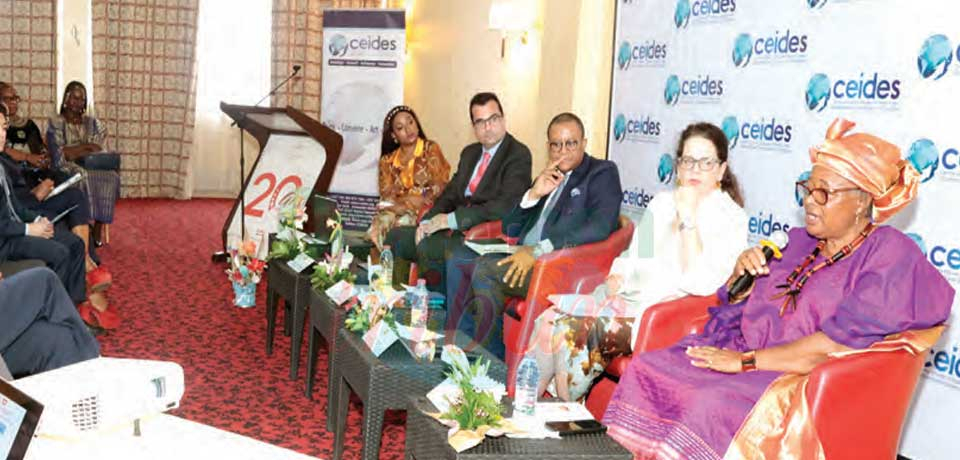Neglected Tropical Diseases: So That The World Won't Continue To Neglect Them
- Par Kimeng Hilton
- 29 janv. 2024 07:54
- 0 Likes

The 71st World Leprosy Day and Fourth World Neglected Tropical Diseases, NTDs Day were marked in Yaounde, Cameroon on Sunday, January 28, 2024.
The theme of the 2024 Fourth World Neglected Tropical Diseases, NTDs Day celebrated on Sunday, January 28, 2024 is “Unite, act, eliminate.” While the 71st World Leprosy Day theme is “Ending Stigma and Embracing Dignity.” Marking this year’s World Neglected Tropical Diseases Day was meant to be time of intense advocacy that brings together civil society advocates, community leaders, global health experts and policy makers. All working across the diverse NTD landscapes but unified behind a common goal. To face NTDs and put an end to them through control and elimination strategies, particularly vector control, and comprehensive case management.
Communicable Diseases Caused By Poverty
Neglected Tropical Diseases are a group of 20 communicable diseases that affect more than 1.7 billion people worldwide. Some 39 per cent of who live in Africa. NTDs are rampant in poor countries, disrupting the lives of about a billion people around the world by endangering their health. Poverty favours the presence and spread of these diseases which, in turn, aggravate and maintain the level of deprivation in which affected communities already live.
The World’s Poverty Burden
Some 2.7 billion poor people in the world today live on less than US $2 per day. Among whom more than a billion suffer from one or more neglected tropical diseases. There are 17 NTDs in Cameroon which affect millions of people. The government handles NTDs under two prisms. With Preventive Chemotherapy (CTP) - onchocerciasis (OV), schistosomiasis (SCH), geohelminthiasis (STH), lymphatic filariasis (LF), trachoma (TRA). And through Intensive Case Management (ICM) - leprosy, yaws, human African trypanosomiasis (HAT), Buruli ulcer, leishmaniasis, Guinea worm, snakebite envenomations and scabies.
First Lady’s Crucial Support
The celebration saw members of the Circle of Friends of Cameroon, CERAC express love, concern and solidarity with patients and those formerly affected by leprosy. Members of the humanitarian association created by the First Lady, Chantal Biya, spent time with leprosy victims in a former leprosy settlement in Mballa II, Yaounde.
CERAC’s delegation, led by Mrs. Agnes Amadou Ali, one of its Vice Presidents, offered foodstuff, medicines, toiletries and other basic necessities to victims. She called for solidarity in building a society conducive for the development of disadvantaged people.
According to Mrs Amadou Ali, the fight against leprosy calls for collective and multisectoral responsibility to achieve the goal of zero leprosy. She said the First Lady and CERAC stand for the continuous fight against leprosy. Beyond physical suffering, leprosy patients suffer social exclusion. Everyone is therefore challenged to understand that the elimination of leprosy is only possible if the stigma associated with the disease is also eliminated.
Leprosy, Still Very Much Present Globally
Dr Etienne Nnomzoo of the World Health Organisation, WHO said leprosy was still present in more than 120 countries, with over 200,000 new cases reported every year. The decline in the number of new cases has been gradual. However, he noted that 10,302 new paediatric cases were recently reported worldwide. But thanks to advances in medicine, leprosy is preventable and treatable, and treatment is free and available in health facilities in Cameroon.
Hansen's Bacillus
Although Hansen's bacillus, which causes leprosy continues to circulate in the country in a residual manner, the Inspector General of Medical and Paramedical Services in the Ministry of Public Health, Dr Yves Mathieu Zoa Nanga, said efforts have been made by Cameroon to curb the scourge. This is why the number of new cases of leprosy decreased from 25,031 in 1985 to only 183 cases at the end of 2023. Dr Zoa Nanga stressed that the celebration took place at a time government is implementing the Global Leprosy Strategy 2021-2030. The strategy focuses on combating stigma and ensuring respect for the human rights of leprosy victims. Thus the theme of this year’s World Leprosy Day celebration, “Ending Stigma and Embracing Dignity.”
Consider All Of Them
“All Neglected Tropical Diseases must be taken into consideration in the “One health” approach. The World Health Organization, WHO and the international community insist on countries appropriating the fight against NTDs and raising funds to eliminate the diseases. However, it will be difficult to eliminate NTDs if we only count on local funding,” cautioned Ayissi Georges, the Sub-Director in the Ministry of Public Health/Coordinator of the Fight Against Tuberculosis.
Helen Keller’s NTD Support
“Though we celebrated the 71st Leprosy Day, the event was extended to all Neglected Tropical Diseases in the world today. Leprosy is one of them. Since 1992, Helen Keller Int’l has been supporting Cameroon in the fight against NTDs. We offer substantial material, human and financial support to government to help eliminate, control and eradicate various Neglected Tropical Diseases,” Hendji Yoya Michel, the Deputy Country Director, Helen Keller Int’l Cameroon noted.
“Thanks to support from Helen Keller Int'l through the USAID-funded Act to End NTDs West managed by FH1360, Cameroon is about to eliminate two diseases – trachoma and lymphatic filariasis. Concerning onchocerciasis, studies show that its prevalence is reducing in many parts of Cameroon. Our support has also been for the management and surgical operations of other NTDs in Northern Cameroon,” Hendji Yoya added.
The Spotlight Was Taken Away
“This year we celebrated the Fourth International Day Against Neglected Tropical Diseases. Cameroon has about 14 Neglected Tropical Diseases. These diseases are described as “neglected” because the spotlight was taken away from them to major killer diseases like HIV/AIDS, malaria and tuberculosis…,” Dr Nko Ayissi, the National Coordinator of the Fight Against Neglected Tropical Diseases, disclosed.
Hope 2030 For Trachoma, Lymphatic Filariasis
“Much has been done concerning trachoma such as mass drug distribution, surgical operations and other measures like sanitation, provision of good drinking water, the eradication of poverty…” Dr Ayissi underscored. “As a result,” Dr Nko warned, “Trachoma will only be eliminated of poverty is dealt with. We still have people living in extreme poverty in our nation. Eliminating trachoma requires interventions in other areas that are not necessarily health-related. Such as the environment, water and sanitation, education, town planning… Nevertheless, Cameroon is on target to eliminate trachoma and lymphatic filariasis. We hope to eliminate them by 2030 in Cameroon,” Dr Nko expressed hope.
Post-treatment Challenges
“Leprosy on the other hand is an old neglected disease that has become rare. In Cameroon, leprosy has been eliminated as a public health challenge. But there are hotspots that have to be dealt with. We need to continue to act together to eliminate leprosy. For those who have been healed of leprosy, there are still others challenges such as stigmatisation, reintegration into society….,” Dr Nko Ayissi pointed out.
What Are They?
Neglected Tropical Diseases are a group of 20 diseases. These are Buruli Ulcer, Chagas Disease, Dengue and Chikungunya, Guinea worm disease, Echinococcosis, food-borne Trematodiases, African Human trypanosomiasis, leishmaniasis, and leprosy. The others are lymphatic filariasis, mycetoma, chromoblastomycosis and other deep mycoses. While onchocerciasis, rabies, scabies and other ectoparasites
Cet article complet est réservé aux abonnés
Déjà abonné ? Identifiez-vous >
Accédez en illimité à Cameroon Tribune Digital à partir de 26250 FCFA
Je M'abonne1 minute suffit pour vous abonner à Cameroon Tribune Digital !
- Votre numéro spécial cameroon-tribune en version numérique
- Des encarts
- Des appels d'offres exclusives
- D'avant-première (accès 24h avant la publication)
- Des éditions consultables sur tous supports (smartphone, tablettes, PC)
Reactions
De la meme catégorie
En kiosque
Les plus Lus
- Douanes : un réseau de fraudeurs démantelé 47
- Importation des produits cosmétiques: il faut traquer les fraudeurs 25
- « Ce dont notre monde a besoin, c’est de plus de solidarité » 12
- Gestion des personnels de l'Etat et de la solde : l’application Aigles à la Une 11
- Indomitable Lions : Marc Brys Begins Scouting For Players 12














Commentaires